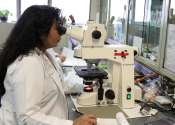Delft University of Technology, (TU Delft) was established in 1842 in Delft, The Netherlands. As of 2007, TU Delft is the largest and most prolific in terms of research publications in the broad field of technology. The student body consists of 14,299 students including Master's and Doctoral students. The academic staff of 2712 includes notable scientists and researchers. TU Delft is regarded with esteem throughout the world for its achievements.
- Address
- Postbus 5, 2600 AA Delft, The Netherlands
- Website
- http://www.tudelft.nl/
- Wikipedia
- http://en.wikipedia.org/wiki/Delft_University_of_Technology
Some content from Wikipedia,
licensed under CC BY-SA
Subscribe to rss feed








